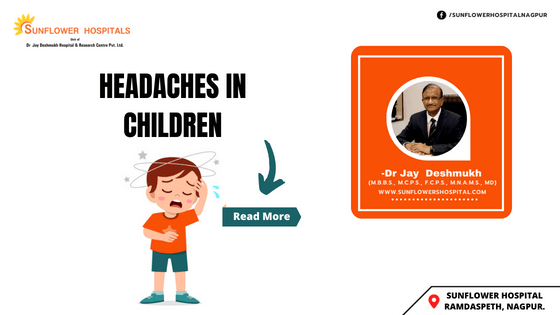How is headache different in children?
Like adults, children have the same types of headaches, but in young children, it is difficult to diagnose as young children cannot describe their headaches. However, certain symptoms are common in children and in adults as well.
What are the symptoms of migraine in children?
Pulsating or throbbing pain in the head, pain that worsens with activity, nausea, vomiting, abdominal pain, and extreme sensitivity to light and sound are the common symptoms. Infants who can-not communicate, may only cry or rock back and forth to indicate pain.
What about tension types headaches in children?
There would be mild to moderate pulsating type headaches on both sides, pain that does not worsen by activity. Tension headache is not accompanied by nausea and vomiting as in migraine. Younger children may withdraw from regular play and like to sleep more. Tension-type headaches may last from 30 minutes to several days.
What are cluster headaches in children?
They occur in groups of five or more episodes, ranging from one headache daily to eight “nine times daily. There is sharp shooting pain on one side of the head that lasts for few
Headaches in children are common and usually not serious. Like adults, children can have different types of headaches, like tension headaches and migraine. Some children can have chronic daily headaches. High levels of stress, following injury to the head, need to be seen carefully. Persistent vomiting or visual changes needs prompt attention. Headache that is accompanied by fever and neck pain or stiffness may indicate meningitis and requires very prompt attention.
How does migraine present in children?
A pressing type of pain in the head and neck, it may be not pulsatile on both sides of the head and neck, not worsened by activity rarely accompanied by vomiting. Anxiety and minor injuries to the head, hypertension in children, and infections in the sinuses can cause headaches in children. The treatment depends on the cause of the headache.
Hours. These headaches are accompanied by weariness, congestion, runny nose or restlessness, and agitation.
When is a headache that is serious and prompts quick medical attention?
You need to take prompt advice from your Doctor in case of some specific situations. Headache that wakes up your child from sleep, a headache that worsens or occurs more frequently, a Headache that has changed your child’s personality. Headache Children prefer to remain in a quiet room away from light to get relief. There may be a family history of migraine.
What are the types of migraine in children?
There could be the classic migraine where children have an aura in terms of flashes of light, zigzag lines, and headaches followed by vomiting. In sonic, migraine may start with abdominal pain. Other type includes menstrual migraine that begins two days prior to menstruation and ends with the end of menstruation.
How do prevent migraine in children?
Psychological triggers like stress, anxiety, worry, depression, fatigue, fever, illness, poor sleep habits, irregular meals, fasting, hypoglycemia, and dehydration should be avoided. When the migraine episode starts, the child should rest or sleep in a dark and quiet room.
What is the treatment for migraine in children?
Ibuprofen is effective and can be the first line of treatment in children. Paracetamol may be effective in mild cases. Sumatriptan nasal spray is effective and should be considered in the treatment of migraine in adolescents. Beta-blockers in appropriate doses are given to prevent migraine and avoid them in asthmatics, diabetics, and in depression. Cyproheptadine, Amitriptyline, Topiramate, and Flunarazine are also used to prevent migraine. Evaluation of headaches in children depends on the presentation and type of headache. In unusual forms and those with persistent neurological features, seizures, or associated difficulty in walking or with visual disturbances, a detailed neurological review, MRI or CT of the brain, and CSF studies may be required.


